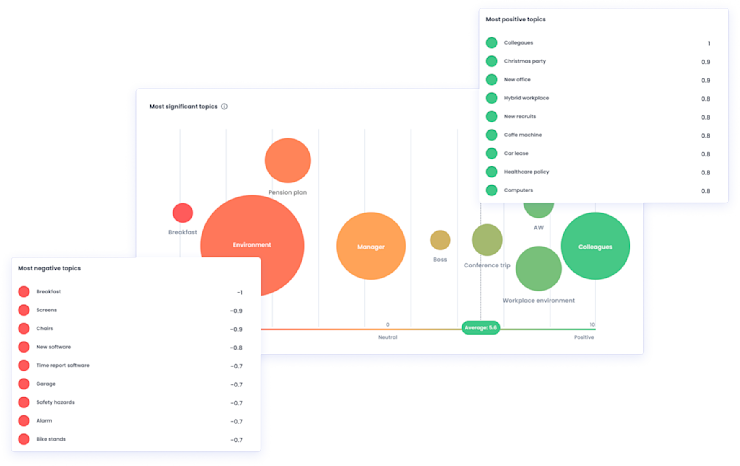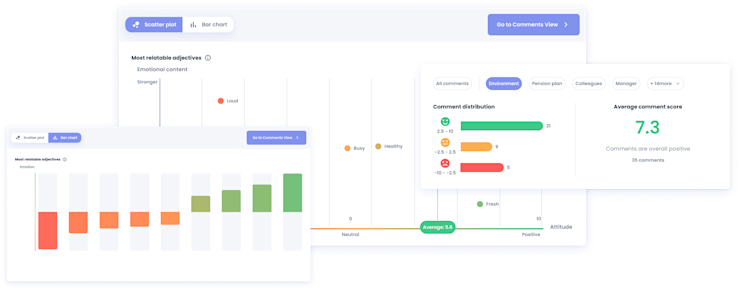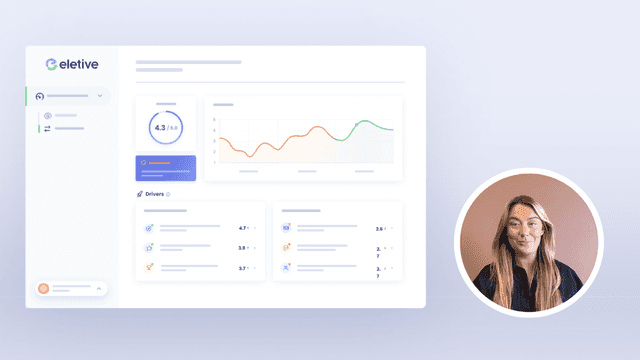When sending out employee surveys, it’s good practice to include open-ended questions. However, open-ended questions generate a lot of data, and reading free-text answers and comments is time-consuming. Comments AI solves this problem.
It's important to include open-ended questions in employee surveys. These questions enable employees to write whatever they want and serve as a complement to standard questions answered by choosing a number on a scale.
Free-text answers often provide valuable information that can be difficult to access in other ways. But with thousands of employees, reading all the answers becomes challenging, if not impossible.
Related reading: Best practices for employee engagement surveys
Comments AI solves the problem
Comments AI is a feature in the Eletive platform developed to help employers interpret the large data sets derived from free-text questions. Comments AI allows you to make sense of and visualize large numbers of free-text answers – in real-time.
Built on advanced AI and NLP functionality, it automatically scans and analyses the free-text answers to provide an immediate overview. You can see what topics are most prominent and if the sentiment in the answers is positive or negative. This means you always know what’s going on in your organisation so that you can apply a proactive approach.
A real-time overview of what matters most to your people
Imagine you have thousands and thousands of employees answering your employee surveys. The free-text answers they provide contain valuable information, but it’s difficult to access due to the sheer amount of answers.
Comments AI solves this problem by instantly categorising and analysing the written answers, and presenting them in a way that allows you to make sense of thousands of responses at a glance.

Comments AI shows you not only what topics people are writing the most about, but also how they feel about these topics. Imagine, for example, that many of your employees are writing comments about their work environment.
If those comments are positive, that word will be prominent (big bubble) and the sentiment will be positive (green bubble). If that’s the case, we can only congratulate you!
However, if many of your employees are writing comments about the same topic – their work environment – but those comments are negative, then you will see a big red bubble containing that word. And you will immediately know that there is some type of issue in the area of the work environment that needs to be addressed.
Drill down for deeper insights
As we’ve seen, Comments AI gives you a real-time overview of what topics are most prominent in your organisation, and how people feel about them. This gives you a clear indication of where to focus your attention. Sometimes, that will be enough.
Other times, you'll want more detailed information. Then the next step is to drill down into the data to understand exactly what’s going on. Comments AI makes this very easy and intuitive.

Once you've identified the most important topics, you can simply click on them to understand exactly what employees are writing about them. You can keep drilling down to the most granular level where you can read each individual survey answer or comment.
You can also filter the answers so that, for example, you only see the comments where the feedback includes "a noisy work environment" or "stressed managers".
Combining Entity and Sentiment Analysis
Curious about the more techy side of things? Let’s have a look at how this actually works! The Comments AI identifies actionable insights from large data sets of comments through two types of analyses: Entity Analysis and Sentiment Analysis.
Entity Analysis inspects the given text for known entities (which, in this context, is another word in for words), and returns information about those entities. From this analysis comes a salience score. The salience score for an entity indicates how important or central that entity (word) is to the entire comment. Scores closer to 0 are less salient, while scores closer to 1.0 are highly salient.
Sentiment Analysis identifies the prevailing emotional opinion within the text, to determine if the respondent’s attitude is positive, negative, or neutral. From this analysis, the presence of emotional content (0, +inf) and a sentiment score (-10 to 10) are derived.
Employee Listening at scale – made easy
Comments AI makes it possible to really listen to and understand the people in your organisation, regardless of how many employees you have. By optimising and streamlining the analysis and reports, Eletive does the legwork for you so that you always have updated real-time insights at your fingertips.
Would you like to explore how your organisation would benefit from Eletive and Comments AI? Get in touch with our sales team for a demo!

























